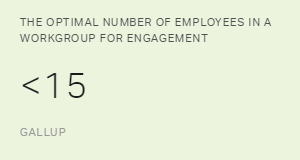Story Highlights
- Nursing turnover hit an all-time high in 2019
- Nurses with less than two years of tenure are most likely to leave
- Learn what hospitals can do to meet the needs of newer nurses
Nurse turnover is a worsening problem with a painful price tag.
According to one study, turnover for bedside RNs reached a record high of 17.2% in 2018 -- costing each hospital an estimated $4.4 million to $6.9 million each year. In 2020, we're likely to see that figure increase as job stress builds as a result of, among other things, the long-term impact of the COVID-19 pandemic.
The majority of this turnover often occurs among nurses with less than two years of tenure, according to Gallup analytics.
In other words, it's likely that younger generations of nurses joining your organization won't stick around long. Because many new nurses need up to 12 months of preceptorship before they're ready to work independently, many health systems are investing millions to train nurses who end up working for the competition.
What can leaders do? Quite simply, instead of backing away from efforts to engage employees during this stressful time -- they should get better at meeting the needs of today's employees. That is, healthcare leaders who want to retain the best nurses must start delivering what nurses want in a job and workplace.
Investing in nurses does far more than boost retention. Engaged, thriving nurses are better performers who promote clinical outcomes, including team performance, patient safety, and clinical ratings.
What do today's employees crave?
All workers share basic needs that leaders must address. But Gallup analytics reveal that younger generations particularly value certain elements in a workplace culture:
-
Purpose: Compensation matters, but younger workers are more motivated by mission and meaning than by dollars and cents.
-
Development: Today's employees crave development -- and they expect their workplaces to provide ongoing opportunities to learn and grow.
-
Coaching: Modern workers don't want bosses. They want coaches -- managers who create authentic relationships and offer individualized development.
-
Ongoing conversations: Annual performance reviews are outdated and unmotivating. Younger generations need consistent feedback that helps them hone their skills.
-
Strengths: Managers who emphasize overcoming weaknesses won't inspire employees. On the other hand, employees approach their work with enthusiasm when their managers celebrate and cultivate their strengths.
Remedying nurse turnover is no easy feat -- it requires a holistic approach and continual commitment from leaders.
Fortunately, there are practical ways leaders can build a workplace culture that's irresistible to the next generation of talented nurses. The following strategies are based in Gallup's decades of experience working with world-class healthcare organizations.
Ensure nurses can readily connect with your organization's purpose.
Employees' sense of purpose directly affects turnover. In fact, Gallup analytics show that a 10% improvement in employees' connection with the mission or purpose of their organization can result in an 8.1% decrease in turnover.
First, executives need to clearly identify their health system's purpose -- why it exists and how it aims to serve employees, patients and communities. Then, leaders must infuse this purpose throughout each aspect of the employee experience, from communications to performance management processes.
Employees' sense of purpose directly affects turnover.
A compelling mission can attract talented nurses, but employees are likely to leave if they perceive that leaders and managers are not committed to the organization's values. It's up to leaders to demonstrate their dedication to the organization's purpose in their words, actions and strategic decisions.
Nurse managers play a critical role in inspiring new nurses and helping them see how they further the organization's mission. For example, whereas bedside nurses directly affect patient wellbeing, nurses in administrative roles support patient outcomes indirectly. Great nurse managers help every individual understand how their work connects to the big picture and serves the organization's broader purpose.
Make onboarding a journey to encourage nurses' development.
A recent Gallup study found that only 12% of employees strongly agree that their organization does a great job of onboarding new employees.
The result? Woeful turnover within the first year of employment and low engagement among employees who stay.
One of the biggest problems with current onboarding programs is their brevity. Well-intentioned leaders want nurses to rapidly integrate. The trouble is, new employees typically need 12 months to reach their full performance potential within a role.
Nurses who are suddenly on their own after orientation and preceptorship are likely to feel overwhelmed, incompetent and unsure of what's expected of them. Further, new nurses might distrust their employer if they discover that the experience they signed up for is nowhere to be found. These frustrated nurses with buyer's remorse are likely to wave goodbye.
Healthcare leaders should view onboarding as a journey. This means helping nurses learn and grow throughout their first year on the job. Organizations should offer regular check-in opportunities, developmental experiences and social events for new nurses.
For example, new hires who complete orientation in a cohort might form meaningful social connections that are quickly lost after orientation. Leaders can enrich onboarding experiences by creating opportunities for new hires to remain connected with other "rookie" colleagues who are navigating similar challenges and goals.
Exceptional onboarding programs offer nurses continual learning, easy access to resources and a sense of belonging. During (and after) onboarding, organizations must communicate that each nurse is valued and has a promising career path.
In Part 2 of our series, we explore how strengths-based, ongoing coaching conversations can remedy nurse turnover and advise healthcare leaders on how to make the most of those coaching conversations.
Learn more about retaining and engaging the best nurses possible:
- Download our perspective paper, Creating an Exceptional Onboarding Journey for New Employees.
- Cure modern healthcare starting with its people. Learn more about Gallup's healthcare solutions.
- Start building a high-development culture through your employee engagement strategy.



